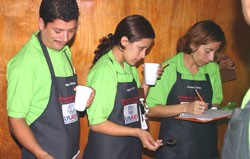
When Ingrid Cornejo sips a cup of coffee she is now likely to use words like "citric," "chocolaty" or "herbal" to describe the flavor. She also can describe a bad cup of coffee. "If it has a taste like dirt, fermentation, mold or medicine, it's defective."
These are just two of the new skills that Ingrid learned during a USAID-supported course that trained 20 young farmers as junior cuppers — specialists in evaluating the taste and aroma of coffee.
Ingrid's family grows certified organic coffee, and her father belongs to one of the seven farmers' organizations receiving assistance from a USAID program, which helps producers improve the quality of their coffee so they can sell it in higher-paying specialty markets. The 2,000 producers participating in the program have exported 345,000 pounds of specialty coffee since 2003.
USAID also financed 21 laboratories, many of which are located right on the farm, and trained 65 sons and daughters of coffee farmers as cuppers to monitor coffee quality. Some of the cuppers trained by the program are now professionals, including Lexania Marin, who was the teacher for Ingrid's junior cupper course.







Comment
Make a general inquiry or suggest an improvement.